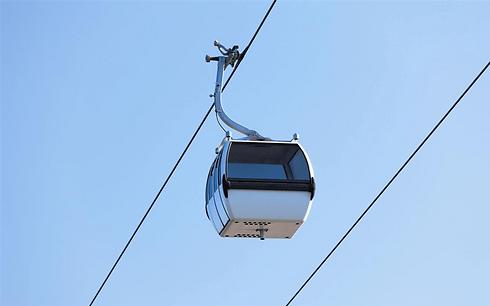
Haredim threaten protests over Jerusalem cable car
New initiative aimed at solving traffic problems in capital's Old City faces tough opposition from ultra-Orthodox population, which fears it will be operated on Shabbat and violate Western Wall's sanctity.
The new cable car is set to carry 6,000 visitors an hour to Jerusalem's Old City in a bid to solve the traffic problems in the area, but the Eda Haredit is threatening to launch fiery protests against its possible operation on the Jewish day of rest.
Hapeles newspaper, which is affiliated with the Bnei Torah faction led by Rabbi Shmuel Auerbach, reported recently that the faction's rabbis were about to decide whether to insist on keeping the cable car closed on Shabbat.
On the other hand, some faction members presented the need for the cable car, which will connect Dung Gate – which leads to the Western Wall – with the Cinematheque compound, as a mode of transportation which could solve traffic problems in the crowded Old City.

The Eda Haredit leaders have already announced their intention to launch a struggle against the project, which would likely include a radicalization of the traditional Shabbat protests. "We will be able to stop it only by bravely and firmly standing up to them," the faction's mouthpiece wrote.
The paper further claimed that by building the cable car, the municipality was trying to connect "the worst places of promiscuity in Jerusalem, and to lead tourists and visitors from there to the Western Wall."
A five-page article described the advantages and disadvantages of the cable car, and part of it was dedicated to its possible operation on Shabbat. Newspaper editors who had been associated with late spiritual leader Rabbi Yosef Shalom Elyashiv recalled that a proposal made several years ago to install escalators in the Old City. Then-Mayor Uri Lupoliansky asked for Rabbi Elyahiv's opinion, and the rabbi stated that "from the moment such a stairway is built, there is no way to guarantee that it will not be operated on Shabbat."
Deputy Jerusalem Mayor Haim Epstein, who is against the cable car's operation on Shabbat, said that when the escalator initiative was on the agenda, he had managed to get a group of haredi investors to express an interest in the innovative project, but Rabbi Elyashiv had rejected it.
"The haredi investors were very enthusiastic and expressed their willingness to invest the required sum in order to make the initiative 'ours.' The moment we control it, we can force an arrangement which will stop it from working on Shabbat and maintain the sanctity of Shabbat in the Old City," Epstein revealed.
The legal argument for not operating the cable car on Shabbat stems from the fact that it was build in order to deal with traffic problems, apart from being a tourist initiative.
Therefore, it is defined as a mode of transportation and is subject to the status quo which bans the operation of public transportation on Shabbat. Another argument raised by the haredim has to do with the modesty and sanctity of the Western Wall, which they say might be violated.
The Jerusalem Municipality offered the following response: "The cable car is slated to serve as a mode of transportation for all intents and purposes and not just as a tourist initiative, and there is no plan to operate it on Shabbat in accordance with the status quo in the city and in the country."










